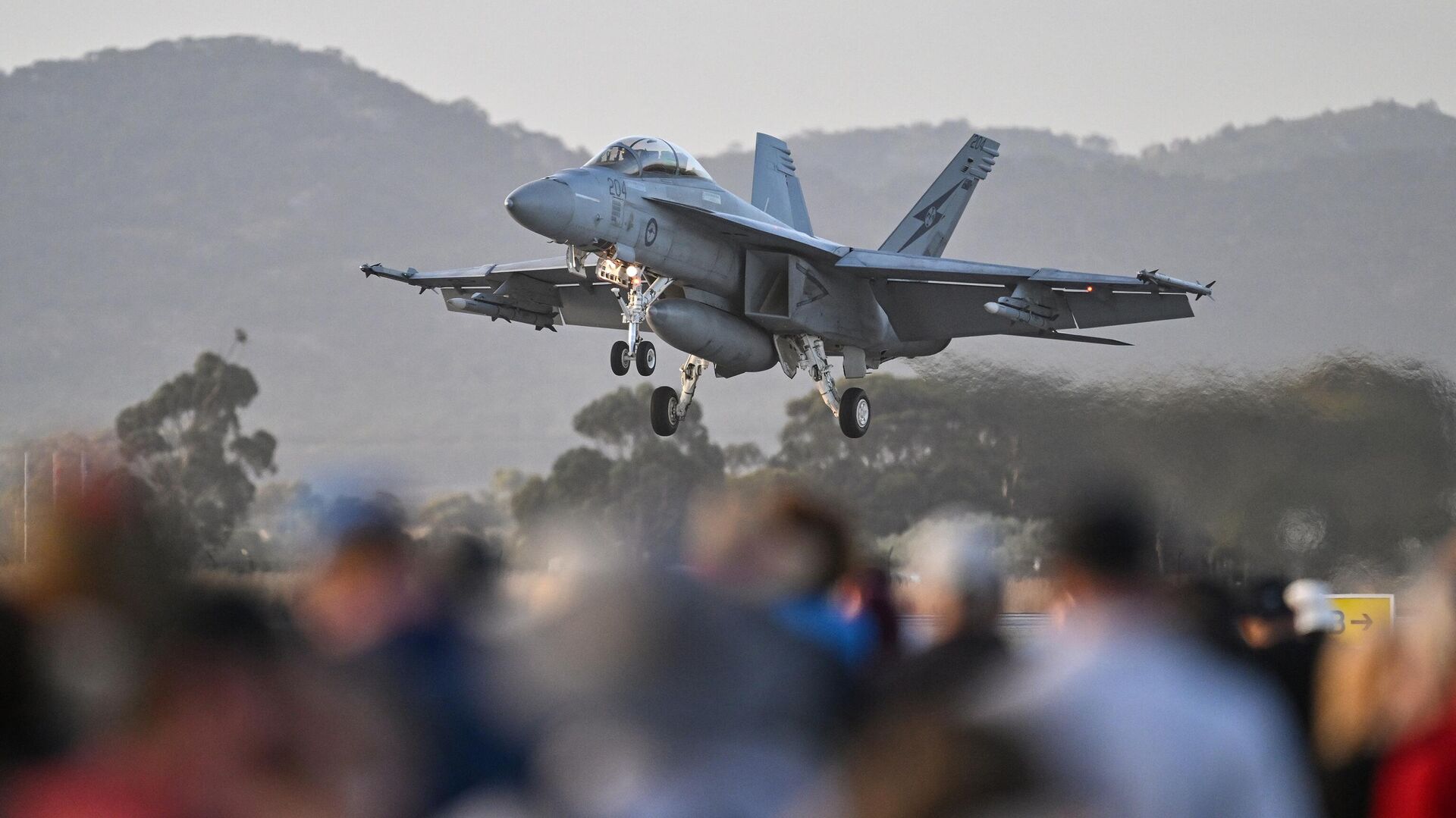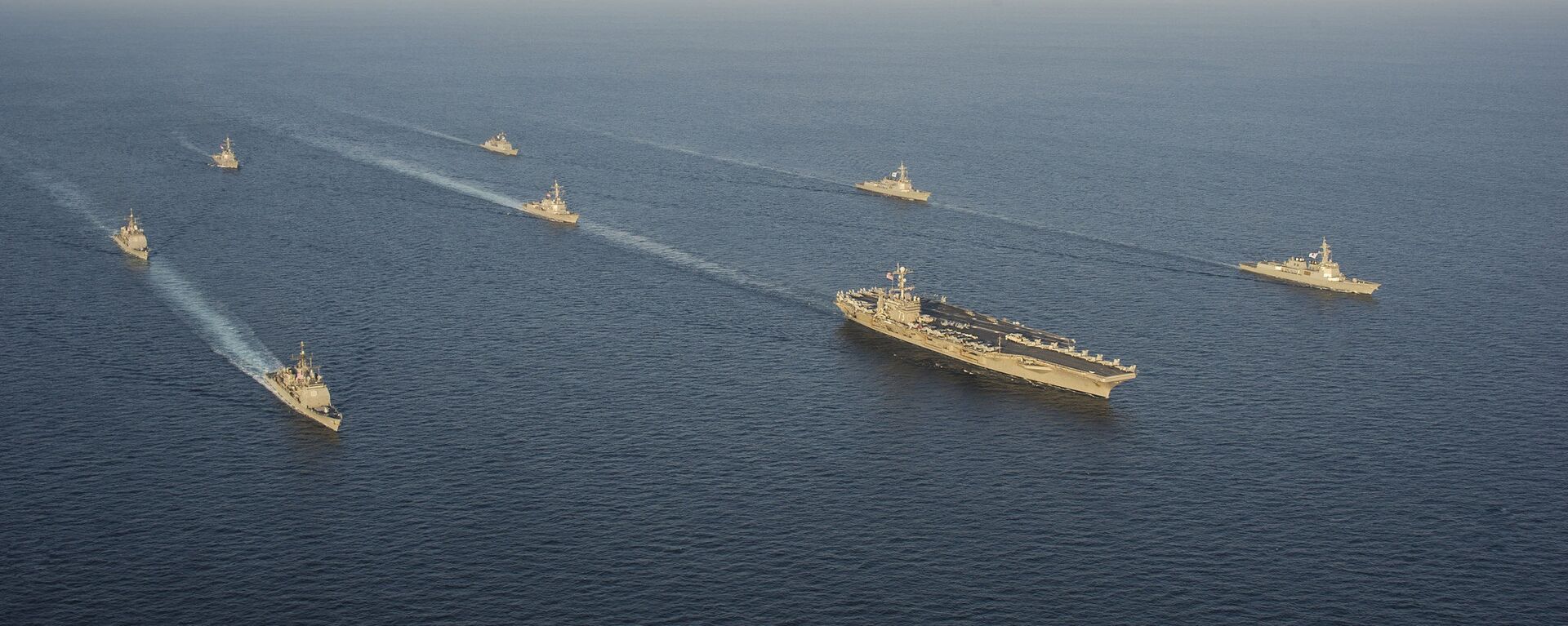https://sputnikglobe.com/20230424/australia-unveils-new-strategic-defense-review-to-become-more-self-reliant--1109788783.html
Australia Unveils New Strategic Defense Review to Become 'More Self-Reliant'
Australia Unveils New Strategic Defense Review to Become 'More Self-Reliant'
Sputnik International
The document stipulates the Australian Defense Force prioritizing an array of areas, including development of nuclear powered submarine fleet and longer range strike capability.
2023-04-24T11:32+0000
2023-04-24T11:32+0000
2023-04-24T11:32+0000
australia
us
china
defense
review
nuclear submarine
military
https://cdn1.img.sputnikglobe.com/img/07e7/04/18/1109788625_0:161:3071:1888_1920x0_80_0_0_94d9b1997602b5c1b7e408cbc6e7667d.jpg
The Australian government has released the public version of the country’s new Defense Strategic Review (DSR), which Canberra claims “sets the agenda for ambitious, but necessary, reform” to the military’s “posture and structure.”Prime Minister Anthony Albanese touted the review as "the most significant work that's been done since the Second World War."According to him, the implementation of the DSR will help Australia become “more self-reliant, more prepared and more secure in the years ahead.”The review called for a rapid transformation of the Australian Defence Force (ADF), which will gain the ability to strike targets more than 500 km away, up from the current 40 km range.In addition to defending Australia and the immediate region, the ADF will be required to “deter through denial any adversary’s attempt to project power against Australia through our northern approaches," according to the DSR.In this vein, the DSR warned that Australia should "avoid the highest level of strategic risk we now face as a nation: the prospect of major conflict in the region."On the other hand, the review pointed out that Australia would work more closely with the US, including increased bilateral military planning and hosting more rotations of American forces, including submarines.Since the establishment of AUKUS a couple of years ago, Russia has repeatedly warned of joint efforts by the US and its regional allies, including Australia, New Zealand and Japan, to militarize the Asia-Pacific. According to Moscow, NATO had stopped talking about its defensive nature as the alliance focuses, in particular, on expanding its clout in the region.Australia, the US and the UK announced the AUKUS defense partnership in September 2021. The first initiative announced under the pact was the development of nuclear-powered submarine technology for the Royal Australian Navy, which prompted the Australian government to abandon a $66 billion agreement with France's Naval Group company on the construction of diesel-electric submarines. Beijing has likewise repeatedly been critical of the AUKUS deal, slamming it as a breach of the Nuclear Non-Proliferation Treaty.
https://sputnikglobe.com/20220712/australia-urges-us-to-boost-military-presence-to-avoid-catastrophic-failure-in-asia-pacific-1097213201.html
australia
china
Sputnik International
feedback@sputniknews.com
+74956456601
MIA „Rossiya Segodnya“
2023
Oleg Burunov
https://cdn1.img.sputnikglobe.com/img/07e4/09/0b/1080424846_0:0:2048:2048_100x100_80_0_0_3d7b461f8a98586fa3fe739930816aea.jpg
Oleg Burunov
https://cdn1.img.sputnikglobe.com/img/07e4/09/0b/1080424846_0:0:2048:2048_100x100_80_0_0_3d7b461f8a98586fa3fe739930816aea.jpg
News
en_EN
Sputnik International
feedback@sputniknews.com
+74956456601
MIA „Rossiya Segodnya“
Sputnik International
feedback@sputniknews.com
+74956456601
MIA „Rossiya Segodnya“
Oleg Burunov
https://cdn1.img.sputnikglobe.com/img/07e4/09/0b/1080424846_0:0:2048:2048_100x100_80_0_0_3d7b461f8a98586fa3fe739930816aea.jpg
australian defense forc, unveiling of australia's new defense strategic review, canberra's cooperation with washington
australian defense forc, unveiling of australia's new defense strategic review, canberra's cooperation with washington
Australia Unveils New Strategic Defense Review to Become 'More Self-Reliant'
The review document stipulates that the Australian Defense Force should prioritize an array of areas, including development of a nuclear-powered submarine fleet and longer-range strike capability.
The Australian government has released the public version of the country’s new Defense Strategic Review (DSR), which Canberra claims “sets the agenda for ambitious, but necessary, reform” to the military’s “posture and structure.”
Prime Minister Anthony Albanese touted the review as "the most significant work that's been done since the Second World War."
"It demonstrates a world where challenges to our national security are always evolving. We cannot fall back on old assumptions. We must build the strength in our security by seeking to shape the future rather than waiting for the future to shape us," he told reporters.
According to him, the implementation of the DSR will help Australia become “more self-reliant, more prepared and more secure in the years ahead.”
The document outlined at least six “priority areas for immediate action”, including the development of Australia’s nuclear-powered submarine capability and longer-range strike capacity, speeding up the integration of new technologies into the military, defense workforce retention and recruitment, plus improving strategic cooperation between Canberra and its key partners in the Indo-Pacific.
The review called for a rapid transformation of the Australian Defence Force (ADF), which will gain the ability to strike targets more than 500 km away, up from the current 40 km range.
In addition to defending Australia and the immediate region, the ADF will be required to “deter through denial any adversary’s attempt to project power against Australia through our northern approaches," according to the DSR.
Separately, the review claimed that the US was no longer the "unipolar leader of the Indo-Pacific," adding that intense competition between the US and China was defining the region and that major power competition brought "potential for conflict."
In this vein, the DSR warned that Australia should "avoid the highest level of strategic risk we now face as a nation: the prospect of major conflict in the region."
On the other hand, the review pointed out that Australia would work more closely with the US, including increased bilateral military planning and hosting more rotations of American forces, including submarines.
Since
the establishment of AUKUS a couple of years ago, Russia has repeatedly warned of joint efforts by the US and its regional allies, including Australia, New Zealand and Japan, to militarize the Asia-Pacific. According to Moscow, NATO had stopped talking about its defensive nature as the alliance focuses, in particular, on expanding its clout in the region.
Australia, the US and the UK announced
the AUKUS defense partnership in September 2021. The first initiative announced under the pact was the development of nuclear-powered submarine technology for the Royal Australian Navy, which prompted the Australian government to abandon a $66 billion agreement with France's Naval Group company on the construction of diesel-electric submarines. Beijing has likewise repeatedly been critical of the AUKUS deal, slamming it as a breach of the Nuclear Non-Proliferation Treaty.




